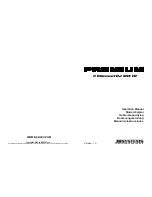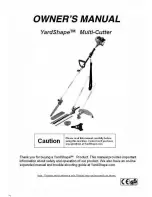
30
Manual de Instrucciones
NEUMÁTICOS
Verifique la presión de los neumáticos.
Entre las primeras 4 y 8 horas de trabajo, reapriete todas las tuercas de las rue-
das. A menudo, verifique el aprieto durante las primeras 100 horas de trabajo.
CALCADOR
La función del calzador es la de mantener el material recogido presionado contra
los resortes recogedores, visando una alimentación uniforme y constante de la
máquina. Sin embargo, es importante observar que el calzador debe comprimir
el material recogido sin restringir su flujo hacia adentro de la máquina.
El calzador sale de la fábrica regulado para una condición típica de trabajo.
Caso esté dificultando la alimentación, o entonces, al contrario, no esté auxiliando
a antener el flujo de material, será necesario providenciar su reglaje.
En este caso, suelte la tuerca del stop A y reposiciónelo.
Cuanto más hacia arriba el stop A es posicionado, mayor será la presión del
calzador sobre el producto y viceversa.
40 lbs/pol
2
(2,8 Kg/cm
2
)
35 lbs/pol
2
(2,4 Kg/cm
2
)
B
A
D
C
CALZADOR
fig.45
fig. 46
fig. 47
CALZADOR
Summary of Contents for EXPRESS-5040
Page 1: ......
Page 2: ......
Page 18: ...18 Instructions Manual SECTION A CONNECTION ...
Page 22: ...22 Instructions Manual SECTION B PREPARATION AND OPERATION ...
Page 36: ...36 Instructions Manual SECTION C MAINTENANCE AND LUBRICATION ...
Page 37: ...Instructions Manual 37 PERIODIC MAINTENANCE TABLE ...
Page 77: ...Instructions Manual 77 SECTION D PRACTICAL GUIDE ...
Page 86: ...86 Instructions Manual SECTION E TECHNICAL FEATURES ...
Page 104: ...16 Manual de Instrucciones SECCIÓN A ACOPLAMIENTO ...
Page 108: ...20 Manual de Instrucciones SECCIÓN B PREPARACIÓN Y OPERACIÓN ...
Page 122: ...34 Manual de Instrucciones SECCIÓN C MANTENIMIENTO Y LUBRICACIÓN ...
Page 163: ...Manual de Instrucciones 75 SECCIÓN D GUÍA PRÁCTICO ...
Page 165: ...Manual de Instrucciones 77 SÍNTOMA CAUSA PROCEDIMIENTO ...
Page 166: ...78 Manual de Instrucciones SÍNTOMA CAUSA PROCEDIMIENTO ...
Page 167: ...Manual de Instrucciones 79 SÍNTOMA CAUSA PROCEDIMIENTO ...
Page 168: ...80 Manual de Instrucciones SÍNTOMA CAUSA PROCEDIMIENTO ...
Page 169: ...Manual de Instrucciones 81 SÍNTOMA CAUSA PROCEDIMIENTO ...
Page 170: ...82 Manual de Instrucciones SÍNTOMA CAUSA PROCEDIMIENTO ...
Page 172: ...84 Manual de Instrucciones SECCIÓN E CARACTERÍSTICAS TÉCNICAS ...
Page 175: ......
Page 176: ...4071022 Revisão 3 ...
















































